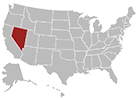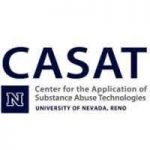
In 2021, Nevada passed an important bill that requires all professional recovery support specialists to get certified.
This bill outlined several important guidelines that you must meet if you’re interested in this career.
Should you be?
If you’re someone who’s gone through addiction recovery and want to help others who have struggled, yes, you should.
Page Navigation
Steps to Become a Professional Recovery Coach in Nevada
Becoming a recovery coach in Nevada requires following all rules created by the bill SB69.
Thankfully, these guidelines are fairly simple to understand and don’t require an expensive investment for most people.
In fact, most are basically common sense rules that make it easier for you to successfully start this career without much difficulty.
Step One: Complete Your High School Degree
All professional recovery support staff (PRSS) or professional recovery coaches must follow several training requirements before beginning.
For example, you’ll need to be at least 18 years old and possess a high school degree or equivalent.
A GED would be a great alternative if you didn’t finish your high school education.
You must also live or work in Nevada for 51% of the time.
Step Two: Earn Lived and Work Experience
Nevada PRSS professionals must have experience with addiction and have two years of continuous recovery.
What this means is that you’ve been sober for two years or continually and actively improving your health.
This requirement is critical because it shows that you understand this experience and can provide the help required to overcome these issues.
You’ll then need at least 475 hours of volunteering or paid work experience in peer recovery domains.
This experience includes working directly with addiction recovery facilities as a volunteer or working part- to full-time in these fields.
You can also work under an NCB-certified supervisor in a related field to earn these important work hours.
Step Three: Complete PRSS 101 Foundational Courses
After you’ve earned the proper life and work experience, you must pass a PRSS 101 Foundational Course.
These include core skills and hands-on training in a variety of settings.
These include options for online, self-paced training as a peer support specialist or an undergraduate certificate.
Both will help you earn appropriate training hours.
The online course is a 46-hour program that will qualify for your certification needs, while the undergraduate certificate covers at least 120 hours in our field.
Both work well for people interested in this field.
Once you’re done, you can move on to your non-clinical work, which will provide you with more hands-on experience in this job field.
Step Four: Complete 25 Hours of Non-Clinical Supervision
Once you’ve completed one of the state-sanctioned PRSS 101 foundational training courses, you’ll be fit into a non-clinical facility.
This step may include setting you up with an addiction treatment facility or hospital where you can learn important skills.
During this training, you’ll get paired with a supervisor who can track your progress and provide help for your education.
After you’ve completed this training, you can apply for the IC&RC peer recovery exam.
This test covers important subjects, such as how to work with people experiencing addiction-related health issues.
After passing the test (which costs $35), you can begin applying for jobs in this field.
You can also get a national certification, which costs $150 and $75-150 yearly or biennially.
Schools in Nevada
While you don’t need a college degree to start a career as a professional recovery coach in Nevada, there are a few training options that can help you start.
These unique programs can give you several hours of training and immerse you in the unique world of professional recovery coaching.
They can also help cover some of your required training hours for your training.
Center for the Application of Substance Abuse Technologies (CASAT)
CASAT is a training program in Reno that provides undergraduate certificates for professional recovery coaches.
This 12-credit certificate is designed for people who have gone through addiction recovery and who want to become a coach.
You’ll get 120 hours in the field and learn how to apply your skills to practice within a behavioral health agency.
Foundation for Recovery
Foundation for Recovery is a training program that teaches you about individualized peer support, mutual aid and group support, amenities and resources, and much more.
You can also get help finishing your GED and college education, which can make training easier.
This Nevada-based program is one of the most popular in the state.
Recovery Coach Representative Schools in Nevada – Summary Table
Top 2 Schools in Nevada
| School Name | Address |
|---|---|
| Center for the Application of Substance Abuse Technologies (CASAT) | 1664 N Virginia St, Reno, NV 89557, United States |
| Foundation for Recovery | 4800 Alpine Pl # 12, Las Vegas, NV 89108, United States |
Salary
How well does Nevada’s professional recovery coach’s average salary compare to the national average of $34,337?
Pretty well:
professional recovery coaches make an average of $34,708 in Nevada.
That makes this a good state in which to work this profession.
Annual Salary Range:Average Salary of Professional Recovery Coachs in Nevada
| City Name | Salary |
|---|---|
| Las Vegas | $34,904 |
| Reno | $34,660 |
| Henderson | $34,766 |
| North Las Vegas | $34,904 |
| Sparks | $34,660 |
| Carson City | $34,612 |
| Elko | $29,289 |
| Boulder City | $34,423 |
| Mesquite | $34,388 |
| Fallon | $34,121 |
Regional Salary in Nevada
| Region | Employed | Avg. Annual Salary | Avg. Hourly Pay | Top 10% Annual Salary | Bottom 10% Annual Salary |
|---|---|---|---|---|---|
| Carson City, NV | 50 | $40,630 | - NA - | $64,050 | $23,790 |
| Las Vegas-Henderson-Paradise, NV | 2,120 | $53,460 | - NA - | $95,900 | $23,660 |
| Reno, NV | 440 | $55,220 | - NA - | $82,040 | $24,830 |
* Employment conditions in your area may vary.
Frequently Asked Questions
Do I need to get my certification renewed in Nevada?
Yes, you should get your state certification renewed yearly by paying the simple $35 renewal fee.
If you have a national certification (which lets you work in any state), you must pay $75 every year or $150 every two years.
That ensures your certification stays up to date.
Who does this job fit in Nevada?
Are you someone who’s recovered from addiction and is interested in helping others?
This job may work well for you.
It’s a particularly great job for Nevada due to the extensive alcohol and drug abuse common in Las Vegas and Reno, the two most popular gambling destinations in the country.
Is this a well-paying job for Nevada?
Professional recovery coaches make less than half of the $70,000 state salary average in Nevada.
Does that mean you should find another job?
Not necessarily: remember, Nevada has many high-earning casino executives and colleges that raise this earning considerably.
Where can I get a job like this in Nevada?
Professional recovery coaches typically work in hospitals and addiction treatment centers.
In Nevada, your job options include facilities like New Dawn Detox, Seven Hills Hospital, Resolution Behavioral Health Therapy, and The Fearless Kind, among many other high-quality options.




